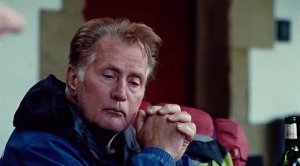The Way
life is too big to walk it alone.

|
Tom's son, Daniel, is the opposite of his father: he chooses to live life as it comes to him, to explore and to not be tied down by a career. In that youthful, adventurous spirit, he sets off on a walk along the Camino de Santiago pilgrimage. But Daniel dies in a tragic accident along the way.
As Tom recovers his son's body, he decides to spread his ashes along the way to Santiago de Compostela. His journey is shared by fellow pilgrims who, together, form a colourful and multicultural mix. As their friendship develops, Tom ends up discovering himself and letting the facade provided by his career and life-choices drop.
Road-trip is a difficult genre: in order to show any depth, film-makers generally have to use instantly likeable characters who are like white pages ready to be painted on by the people they meet along the way. This is turned on its head here: Tom does not want to live an adventure - he was rather happy in his job as an ophtalmologist. This initial resistance to change gives The Way an original and interesting story. This originality more than makes up for the rather one-dimensional co-pilgrims, whose lack of depth, however, allows them to make the film lighter in tone.
The Way is about faith: faith in the ability for someone to start afresh, to change; and about faith in one's travel companions. The photography accompanies that change throughout the film, and even though - as is inevitable in a road-movie - beautiful vistas appear here and there, they usually appear with Tom as their centrepiece. The Way is captivating and will leave any viewer wondering whether they could change to the same extent as Tom did. For that, and for an encouraging story, it is a must-see.
Pierre Schramm
More Information | Back to Previous Schedule | This Season | BBFC Classification Guidelines
Screenings of this film:
| 2011/2012 Autumn Term – (35mm) |


